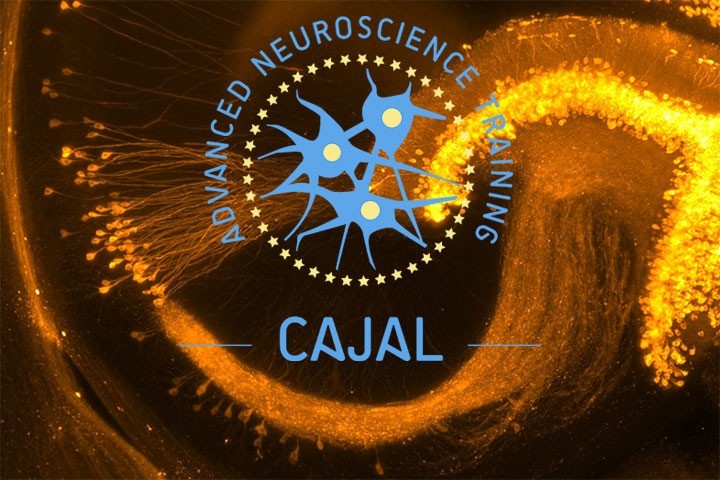
CAJAL course: Neural circuit basis of computation and behaviour
9-27 November 2020, Bordeaux School of Neuroscience
Application deadline : September 1st
How does the activity of neural circuits govern information processing, enable memory formation, and give rise to behaviour? Tackling these questions is one of the great challenges in current neuroscience. To make progress, quantitative studies of both structure and function of neural circuits are required, which these days have become feasible with a collection of new and broad methods. Neural circuit research bridges the molecular-cellular level to the levels of large-scale brain operation and animal behaviour and thus promises to reveal principles of spatiotemporal circuit dynamics that underlie specific brain states and behaviours. The relevance and role of specific cell types and of local as well as long-range circuit motifs need to be understood. This course aims to bring students up-to-date with the most recent developments in this exciting and fundamental field of neuroscience research. The focus will be on the advanced experimental approaches that are available today for the dissection of neural circuit connectivity and activity in various animal models (mouse, fly, zebrafish).
The Cajal course is an intensive three-week course that guides participants through the theory and practice of state-of-the-art methods for addressing pertinent questions in this field of research. This course will teach the latest technological advances in optical, electrophysiological, genetic, viral tracing, anatomical, and optogenetic approaches for the study of neural circuits. Students will learn the current state of knowledge of how neural circuits are organized, especially in the mammalian mouse brain, and how information can be processed in biological circuits through population-based activity patterns. The faculty will consist of international experts in their respective fields, discussing fundamental concepts and their own research, introducing methods relevant for neural circuit research, and providing hands-on projects. Students will perform experimental projects to apply these methods to scientific problems, they will learn how to analyse acquired data, and they will discuss strengths and limitations of the various techniques. The course is designed for PhD students, postdoctoral researchers, and early-stage group leaders, and is aimed at providing them with an enhanced tool set for addressing their current and future research questions.
Course director
 |
| Fritjof Helmchen Brain Research Institute, University of Zurich, Switzerland |
Co-directors
 |
 |
| Andreas Frick Neurocentre Magendie |
Cyril Herry Neurocentre Magendie |
Keynote Speakers
Antoine Adamantidis – University of Bern (Switzerland)
Athena Akrami – University College London (UK)
Matteo Carandini – University College London (UK)
Marie Carlen – Karolinska Institute (Sweden)
Valentina Emiliani – Vision Institute Paris (France)
Rainer Fiedrich – Friedrich Miescher Institute for Biomedical Research (Switzerland)
Nadine Gogolla – Max Planck Institute of Neurobiology (Germany)
Johannes Kohl – Francis Crick Institute (UK)
Matthew E. Larkum – Humboldt University of Berlin (Germany)
Tommaso Patriarchi – University of Zurich (Switzerland)
Pavan Ramdya – École Polytechnique Fédérale de Lausanne (Switzerland)
Nathalie Rochefort – University of Edinburgh (UK)
Lisa Roux – Bordeaux Neurocampus (France)
Manuel Zimmer – University of Vienna (Austria)
Instructors
Roman Boehringer – ETH Zurich (Switzerland)
Gabrielle Girardeau -Institut du Fer à Moulin (France)
Yann Humeau – Bordeaux Neurocampus (France)
Marie Labouesse – University of Zurich (Switzerland) / Columbia University (USA)
Arthur Leblois – Bordeaux Neurocampus (France)
Christopher Lewis – University of Zurich (Switzerland)
Catherine Marneffe – Bordeaux Neurocampus (France)
Gwendolin Schönfeld – University of Zurich (Switzerland)
Sandra Soukup – Bordeaux Neurocampus
Naoya Takahashi – Humboldt University of Berlin (Germany)
Roman Ursu – Bordeaux Neurocampus (France)
Registration
Fee : 3.500 € (includes tuition fee, accommodation and meals)
The CAJAL programme offers 4 stipends per course (waived registration fee, not including travel expenses). Please apply through the course online application form. In order to identify candidates in real need of a stipend, any grant applicant is encouraged to first request funds from their lab, institution or government.
Kindly note that if you benefited from a Cajal stipend in the past, you are no longer eligible to receive this kind of funding. However other types of funding (such as partial travel grants from sponsors) might be made available after the participants selection process, depending on the course.
Last update 31/07/20
